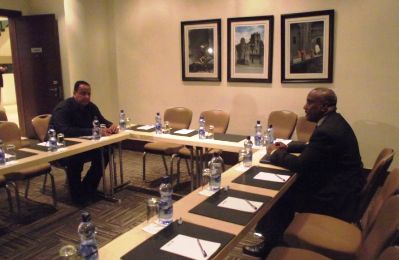SPLM-N announce deal to negotiate framework agreement as Sudan says rebels wasting time
April 28, 2014 (KHARTOUM) – The Sudan People’s Liberation Movement-North (SPLM-N) announced that they have agreed to negotiate a framework agreement with the Sudanese government, while the latter described the move negatively as “a return to zero point”.

While the parties maintained their initial positions, the mediation directed their focus on the issues they have to discuss, proposing to form four panels to negotiate security arrangements, humanitarian access, political matters related to the Two Areas and the national dialogue process.
SPLM-N delegation spokesperson Mubarak Ardol said in a press release on Monday that the AU mediation made significant efforts since the beginning of this round of talks with both parties in order to reach a peace deal.
Ardol announced that the two parties agreed to the need for reaching a new framework agreement on the basis of the African Union Peace and Security Council (UNPSC) resolution 423 and the UNSC resolution 2046 first; adding that the 28 June, 2011 agreement would be used as a reference for the new framework agreement.
He said they engaged in this round of talks in order to achieve a framework agreement on the basis of the agreement signed on 28 June 2011 besides the 18 February 2014 framework agreement proposed by the AU mediation.
The rebel spokesperson noted that the two parties discussed the idea of working through four committees before reaching a framework agreement, saying that the SPLM-N saw that the idea of the committees should stem from an existing agreement while the government sought to immediately form the committees and skip basic stages.
The SPLM-N considers that the 28 June framework deal enables them to participate jointly with the ruling National Congress Party (NCP) to lay the ground for a comprehensive solution involving other rebel groups and opposition parties, they say they do not trust the recent preparations launched by Khartoum government for the national dialogue.
However, the Sudanese government sticks to a framework that the mediation proposed to end the conflict in South Kordofan and Blue Nile, saying the 28 June agreement is no longer fitting with the recent developments in the country after the national dialogue initiative which aims to involve all the Sudanese stakeholders in a process to discuss the democratic transformation.
Sudan’s lead negotiator for peace talks on the Two Areas, Ibrahim Ghandour, has accused the rebel Sudanese People’s Liberation Movement/North (SPLM-N) of “wasting time” since the resumption of the talks.
He said that after three days of discussing a framework agreement proposal, the rebel side declared that what has been discussed is only a suggestion to reach a frame work agreement.
Ghandour underlined the government delegation asked the mediation to directly discuss the draft framework agreement proposed by the AU mediators on 18 February, saying it must be the reference for the work of the four committees which both sides agreed to form in the presence of Thabo Mbeki.
The Sudanese chief negotiator further underscored that the government delegation would leave Addis Ababa only if the African Union High Implementation Panel (AUHIP) suspended the latest round of talks.
But he did not rule out reducing the level of representation, pointing that developments of the negotiation process would determine who will stay and who will leave.
The AU’s chief mediator, former South African president Thabo Mbeki, left the Ethiopian capital three days ago to participate in celebrations in Johannesburg for the 20th anniversary of democratic rule in South Africa and the election of the country’s first black president Nelson Mandela in 1994 after the end of apartheid.
(ST)
